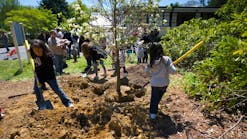The Water Tower Releases First Stakeholder-Driven Lake Lanier Watershed Five-Year Research Plan
The Water Tower, the new water innovation hub in Buford, Georgia, announced the release of its Lake Lanier Watershed Five-Year Research Plan.
The plan, developed with input from local stakeholders and technical experts, provides a multi-year roadmap of project concepts aimed to improve and protect the watershed, according to the press release.
Lake Lanier is the major source of water supply for communities in the North Georgia region, as well as a critical component of local recreation and quality of life. However, Lake Lanier faces supply and water quality challenges from increasing urbanization, urban and agricultural runoff, and drought, according to the press release.
“A healthy Lake Lanier is critical to our regional economy and quality of life. It is imperative that we engage a broad cross section of stakeholders to safely and effectively manage this precious regional resource,” said Melissa L. Meeker, CEO of The Water Tower in the press release. “We have shared responsibility and together we can innovate, engage, and pioneer to create a better water future for the Lake Lanier Watershed and beyond.”
While there have been several research and planning efforts surrounding the lake in the past, there is a need for a coordinated plan that facilitates management, resourcing, and funding of applied research projects that work together to protect this critical water resource.
Development of the research plan, an effort funded by Gwinnett County’s Department of Water Resources and led by The Water Tower with a team of experts from Constantine Engineering (an Ardurra Company) and Carollo Engineers, involved meeting with a wide range of stakeholders including water utilities, government agencies, municipalities, and environmental groups to determine priority research needs facing the watershed.
The group of technical and scientific experts responded to these needs by developing 32 applied research project concepts to address non-point sources of pollution, nutrient management, lake water quality, monitoring programs, and storm water management, among other challenges. The projects will be collaboratively funded, competitively bid, overseen by a third-party advisory committee, and managed by The Water Tower, reported the press release.
The plan can be downloaded on The Water Tower website. The Water Tower welcomes input on any aspect of the plan and is currently seeking funding partners to support the applied research projects. Feedback can be submitted here.






